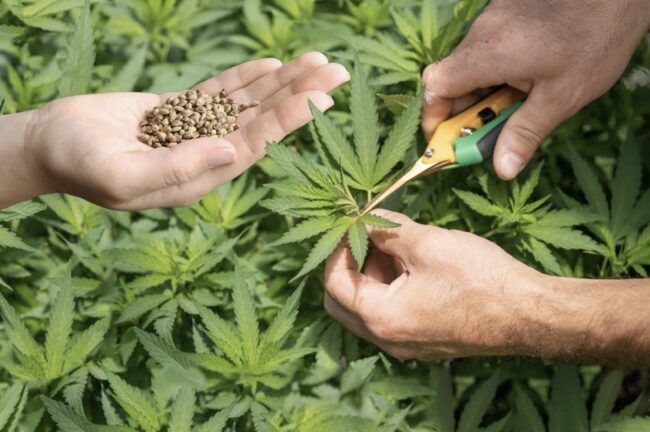
The Ascendance of Cannabis Seeds and Hemp: Legalities and Profitability
The cannabis industry’s growth is no secret. However, it isn’t just the dispensaries that are cashing in on this green rush. In fact, some ancillary businesses have been thriving in the shadows of their dispensary counterparts. Two of these are the cannabis seed and hemp industries.
The Phenomenon of Cannabis Seed Demand
With the increasing legalization of recreational cannabis use, a new consumer interest has burgeoned – the cultivation of cannabis at home. It’s a trend that was first noticed when Minnesota legalized recreational cannabis use in August 2021.
On the day the law passed, residents swarmed Strains of the Earth, a local store, seeking cannabis seeds for home cultivation. The demand was so high that the store’s stock was depleted faster than anticipated, necessitating weekly replenishment.
Learning to Cultivate Cannabis: A Popular Hobby
To meet the growing interest in home-grown cannabis, Strains of the Earth began offering instructional classes on nurturing seeds into fully developed, bud-producing plants. This trend is mirrored across the country, with nearly half of the American population residing in states where recreational marijuana is allowed.
Legal Restrictions and Home Cannabis Cultivation
Despite the popularity of home cultivation, states’ regulations often restrict the number of plants residents can grow. This has led to an increase in the sale of cannabis seeds, the only legal way for consumers to obtain cannabis in some states.
For instance, in Minnesota, most recreational dispensaries won’t be operational until 2025 due to regulatory oversight. In the interim, recreational stores have opened in tribal nations, which operate independently of the state.
Navigating the Legal Gray Area
Other states, like Virginia and Maryland, find themselves in a unique situation. They have legalized recreational cannabis use and possession but haven’t yet established a regulatory framework for a commercial cannabis marketplace.
To fill this gap, local horticulture companies and smoke shops have started selling or even giving away cannabis seeds, operating in this legal gray area. For example, the advocacy group Maryland Marijuana Justice organized a statewide seed giveaway, distributing 30,000 cannabis seeds for free.
The Complex Legal Landscape of Cannabis Seeds
While the sale of cannabis seeds is growing, it’s not without its challenges. One of the primary obstacles is the intricate overlap of botany and legal regulations surrounding cannabis seeds.
Cannabis Seeds and Federal Law
Cannabis remains a Schedule I controlled substance at the federal level, classified as having no medical utility and a high potential for abuse. However, cannabis seeds typically contain minimal to no THC, the psychoactive compound responsible for inducing a high.
This unique characteristic places cannabis seeds in a different realm within agricultural laws, making them similar to ordinary seeds.
The Pennington Letter: A Milestone for Cannabis Seeds
In a significant development, lawyer Shane Pennington sought clarification from the Drug Enforcement Agency (DEA) regarding the status of cannabis seeds. He argued that due to their minimal THC content, cannabis seeds should be categorized under the definition of hemp.
To the astonishment of many, the DEA agreed with Pennington, leading to the official “Pennington letter”. This marked a turning point for the cannabis seed industry, validating their legal ownership and sale.
Marketing Strategies Amid Legal Ambiguities
Despite the DEA’s clarification, the legal status of cannabis seeds remains ambiguous. Consequently, businesses have to resort to convoluted marketing strategies to safeguard their legal standing.
The Prominence of the Hemp Industry
While the cannabis seed industry is flourishing, it’s not the only lucrative ancillary business within the cannabis sector. The hemp industry, particularly hemp-derived cannabinoids, is also making waves.
Hemp Industry’s Market Size
According to a report by Whitney Economics, the U.S. hemp industry in 2022 was larger than all state marijuana markets, and it roughly equaled sales for craft beer, nationally. The hemp-based cannabinoid market saw about $28.4 billion in sales of its products in 2022.
Regulatory Challenges and Opportunities
Despite the thriving market, the hemp industry faces regulatory challenges, primarily related to cannabinoid products like CBD. If federal regulations were enacted to allow for the marketing of cannabinoid products as dietary supplements or food items, the industry could grow even larger.
This scenario is likely, given that the Food and Drug Administration (FDA) has stated it does not have the authority to establish such rules on its own. Congressional lawmakers have proposed to establish these rules.
Conclusion
The cannabis industry is not just about dispensaries. With the rise of the cannabis seed and hemp industries, there are numerous opportunities for businesses to thrive in this green rush.
Companies like PayRio can support these ancillary cannabis industries. Our e-Commerce payment solution is the lowest cost, industry-wide. We offer compliant, stable payment processing and can plug directly into your existing e-Commerce site.
By understanding the unique nature of these ever-changing industries, PayRio is well-positioned to support the growth of the ancillary cannabis industries, like alternative cannabinoids and cannabis seeds.